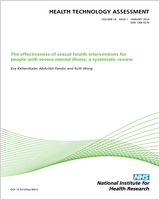Included under terms of UK Non-commercial Government License.
NCBI Bookshelf. A service of the National Library of Medicine, National Institutes of Health.
Richards DA, Rhodes S, Ekers D, et al. Cost and Outcome of BehaviouRal Activation (COBRA): a randomised controlled trial of behavioural activation versus cognitive–behavioural therapy for depression. Southampton (UK): NIHR Journals Library; 2017 Aug. (Health Technology Assessment, No. 21.46.)

Cost and Outcome of BehaviouRal Activation (COBRA): a randomised controlled trial of behavioural activation versus cognitive–behavioural therapy for depression.
Show details- AD-SUS
adult service use schedule
- ADM
antidepressant medication
- AE
adverse event
- AfC
Agenda for Change
- BA
behavioural activation
- BADS
Behavioural Activation for Depression Scale
- CBT
cognitive–behavioural therapy
- CEAC
cost-effectiveness acceptability curve
- CI
confidence interval
- COBRA
Cost and Outcome of BehaviouRal Activation
- CONSORT
Consolidated Standards of Reporting Trials
- CSO
clinical studies officer
- CTS-R
Cognitive Therapy Scale-Revised
- DAS
Dysfunctional Attitudes Scale
- DMC
Data Monitoring Committee
- DSM-IV
Diagnostic and Statistical Manual for Mental Disorders-Fourth Edition
- EQ-5D-3L
EuroQol-5 Dimensions, three-level version
- GAD-7
Generalised Anxiety Disorder-7
- GP
general practitioner
- IAPT
Improving Access to Psychological Therapies
- ICER
incremental cost-effectiveness ratio
- ITT
intention to treat
- MDD
major depressive disorder
- MHW
mental health worker
- MICE
multiple imputation by chained equations
- NICE
National Institute for Health and Care Excellence
- NIHR
National Institute for Health Research
- PenCTU
Peninsula Clinical Trials Unit
- PHQ-9
Patient Health Questionnaire-9
- PM
process measure
- PM1
process measure point 1
- PM2
process measure point 2
- PP
per protocol
- PPI
patient and public involvement
- PSS
Personal Social Services
- PWP
psychological well-being practitioner
- QALY
quality-adjusted life-year
- RCT
randomised controlled trial
- REC
Research Ethics Committee
- RRS
Ruminative Response Scale
- SCID
Structured Clinical Interview for DSM Disorders
- SD
standard deviation
- SEM
structural equation modelling
- SF-36
Short Form questionnaire-36 items
- SHAPS
Snaith–Hamilton Pleasure Scale
- TMG
Trial Management Group
- TSC
Trial Steering Committee
- List of abbreviations - Cost and Outcome of BehaviouRal Activation (COBRA): a ra...List of abbreviations - Cost and Outcome of BehaviouRal Activation (COBRA): a randomised controlled trial of behavioural activation versus cognitive–behavioural therapy for depression
- Assessment of clinical effectiveness - Selective internal radiation therapies fo...Assessment of clinical effectiveness - Selective internal radiation therapies for unresectable early-, intermediate- or advanced-stage hepatocellular carcinoma: systematic review, network meta-analysis and economic evaluation
- Discussion - Non-invasive imaging software to assess the functional significance...Discussion - Non-invasive imaging software to assess the functional significance of coronary stenoses: a systematic review and economic evaluation
- Discussion and conclusions - Clinical effectiveness and cost-effectiveness resul...Discussion and conclusions - Clinical effectiveness and cost-effectiveness results from the randomised controlled Trial of Oral Mandibular Advancement Devices for Obstructive sleep apnoea–hypopnoea (TOMADO) and long-term economic analysis of oral devices and continuous positive airway pressure
- Patient participant and site staff perspectives on acceptability and feasibility...Patient participant and site staff perspectives on acceptability and feasibility of digital technology for home monitoring glaucoma - Feasibility of in-home monitoring for people with glaucoma: the I-TRAC mixed-methods study
Your browsing activity is empty.
Activity recording is turned off.
See more...